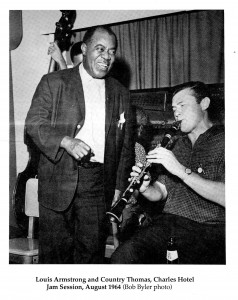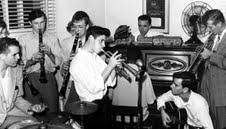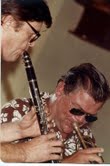Mason "Country" Thomas (1925-2011)
 My friend of six decades Mason "Country" Thomas, whom I first met and saw perform at a Sunday afternoon jam session in January 1950 at Louie’s and Alex’s on U Street in Washington, D.C., died on August 24, 2011.
My friend of six decades Mason "Country" Thomas, whom I first met and saw perform at a Sunday afternoon jam session in January 1950 at Louie’s and Alex’s on U Street in Washington, D.C., died on August 24, 2011.
While his main horns were clarinet and tenor and baritone saxophones, at one time or another Country also played soprano and bass saxophones, trumpet, trombone, tuba, and bass fiddle. I was at a Blindfold record session at D.C.’s Charles Hotel on 14th Street (a venerable jazz venue of the 1950s-1970s) one Sunday night in 1951 when nobody could identify the piano player on the 78 rpm that was played. It turned out to be a home-recorded disc of Country, churning out some hot boogie woogie. Incidentally, with perfect pitch and an uncanny ear, Country could hear a tune once or twice and render it with all its nuances. He was also something of a Renaissance man, holding down a day gig as an air-conditioner and refrigeration serviceman. Another of his talents, I was once told by a fellow musician of his, was fashioning reeds for clarinets and saxophones. Country could repair anything mechanical -- automobile engines, washing machines, you name it.
Country played in many Washington-area bands, for example, the Washington Monumentals and bands led by his close musical associate, cornetist Wild Bill Whelan. Country was a regular presence at both the annual Manassas Jazz Festival (1960s-1980s) and the Potomac River Jazz Club’s annual all-day-and-evening picnic at Blob’s Park in September, sometimes in more than one band. Over the course of his career, Country played most of the jazz venues in the D.C. area. And whenever any of the Eddie Condon gang (e.g., Wild Bill Davison, Bill Whelan’s mentor) came to D.C. for gigs, you would always find Country on the bandstand with them. For them, he was first-call reed player. Country remained musically active into his eighties.
Country had a long-time close musical relationship with cornetist Wild Bill Whelan, who died in 2003. Here’s Country taking a solo after Whelan.
Here is a slide show with Country playing “Willow Weep For Me” on tenor.
Here is the Washington Post obituary of Country.
And below is the text of my March 1984 Washington Post feature on Country.
Mason "Country" Thomas, Multi-Instrumentalist
By W. Royal Stokes
The countless Washington-area bandstands that have cooked with small combos of which multi-instrumentalist Mason "Country" Thomas was either a member or the leader add up to very nearly a complete roster of D.C. jazz venues of the past four decades [i.e., 1940s-1980s]. They include after-hours clubs like the Villa Bea, hole-in-the-wall but star-studded clubs like the Brown Derby, high-end restaurants such as downtown D.C.’s Blue Mirror and Georgetown’s Blue Alley, and all the major hotels. Thomas’s trio presently holds forth Mondays through Saturdays in the Garden Lounge of the new J. W. Marriott Hotel at 14th Street and Pennsylvania Avenue.
A registered member of the after-hours “bottle club” Villa Bea at 19th and California in Adams Morgan, with his personal bottle of whiskey on the shelf behind the bar, Thomas often played there. One night in the early 1940s, before he entered the army, he played clarinet until dawn with a pianist who, he later learned, was Erroll Garner. “He wasn’t famous yet,” says Thomas, “so I didn’t know who he was.”
Thomas, a native of this city [D.C.], grew up in Arlington, attending Washington and Lee High School and then Augusta Military Academy in Staunton, Virginia. He made up his mind in his mid-teens to become a musician upon hearing on radio the clarinet of Artie Shaw. “I always had a keen interest in music,” he explains. “My mother played piano, my father picked guitar and they would have parties where there was a lot of barbershop singing and some people would bring in horns and they’d have kind of jam sessions. They were playing old songs like ‘Somebody Stole My Gal’ and ‘There’ll Be Some Changes Made.’ I knew all those songs before I ever pick up a horn.”
Purchase of a $10 clarinet and introduction to small-band jazz via the record collection of a schoolmate were the first steps in Thomas’ self-instruction, subsequently augmented by formal training at the Brooklyn Conservatory of music. He has played all the saxophones professionally except the alto and at one time or another has earned his living playing trumpet, trombone, tuba, and upright bass. As a youngster he took piano lessons and along the way has “picked some guitar.”
“My god, you couldn’t walk down the street without bumping into all these luminaries,” recalls Thomas of strolls down New York’s 52nd Street in 1943 just before he went into the army to serve as a rifleman-grenadier in Europe in WW2. Thomas made friends as a teenager visiting New York with the likes of saxophonist Coleman Hawkins, guitarist and bandleader Eddie Condon, and clarinetists Mezz Mezzrow and Pee Wee Russell, the latter a major stylistic influence on him. “Those guys were really something else in those days “cause we were just kids and they treated us like we were the greatest thing in the world, buying us food and everything and watching after us to make sure nothing bad happened to us.”
When Thomas returned from the war he lived in New York for part of a year, picking up with his old friends and adding new ones like reed player Ernie Caceres, whom he had heard on V-Disc overseas and been much impressed with. Returning to D.C., he led bands at the Charles Hotel, the Bayou, and the Mayfair, where as sit-ins or guest performers, Louis Armstrong, Wild Bill Davison, Dinah Washington, Hawkins, and many other jazz greats played with this widely respected musician. There were also some periods away from the area for Thomas, for example, playing trombone with clarinetist Tony Parenti in Florida and five years in Las Vegas with trumpeter Wingy Manone and several other bands.
“It isn’t like it was before,” says Thomas, comparing today’s [the 1980s] scene with that of the 1940s and 1950s. When he returned to the area in the early 1960s he found that the all-night jam sessions and the casual sitting-in were a part of history. In their place were “banjos everywhere, sawdust on the floor -- that was all the rage.” For a while “there wasn’t any demand for what we do.” But the jazz scene began to pick up in the mid-1970s and the idiom that Thomas has made his life -- hard-swinging 1940s jazz supplemented by slow-simmering ballads à la tenor saxophonist Ben Webster -- is much in demand in the 1980s. “I’ve been gigging around here with everybody since then,’ he says of the last decade[1970-80s].”



